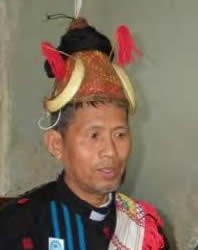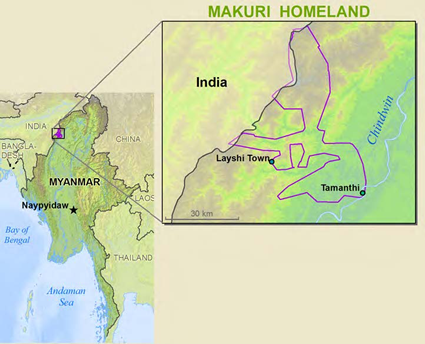In Layshi Township, there are a few thousand Makuri people. The majority of the Makuri people group is Christian; the Gospel message has been preached to them by missionaries since 1950. There are also Makuri animists and Buddhists. The Makuri people live in 12 villages in Layshi Township. They also live in a few villages in Homalin and Lahe Townships. There are also some living across the border in India.
The Makuri language seems to have high language vitality. All the people interviewed seem to have positive attitudes toward their mother tongue. The children are learning the village mother tongue as their first language, and the mother tongue is the only language used in most situations within the village.
There is no indication of the Makuri Naga language being endangered or in the midst of a language shift. There are three main routes by which the Makuri Naga came into Myanmar from India. Those routes are the Makhwale route, the Amimi Khuula route
north of Mount Sarameti, and the Phukhuri, Ahwa Chaung and Chera route north of Nantalet Stream. This stream was previously called Ah Sarti in the Makuri language. The word Ah Sarti in Makuri means "the water which we drank in our birth-place". The stream was also known as Sarti, because, as the years went by, people gradually dropped out the word "Ah" and simply called it Sarti.
There is some dialectal variation within Makuri. The main sub-groups include Makhwale, Saingphule (Saingpuri), Arale, Kyile, Kyaungphuri (Shu), and Shera.There has been some recent Makuri language development. Primers and Bible portions have been produced in recent years, based on the Shera dialect.
There is a definite need for Bible translation among the Makuri Naga for use in evangelism, discipleship, teaching, and church planting work. However, further research is needed to confirm a central dialect for Makuri.
Some Makuri literature development work has been done on the Myanmar side of the border. There is a translation of some parts of the Bible and other materials, based on the Shera dialect. In addition, there are a wide variety of materials available in Burmese [mya] that could be used among the Makuri Naga, although not all of them can understand Burmese well.
Scripture Prayers for the Naga, Makury in Myanmar (Burma).
| Profile Source: Anonymous |











